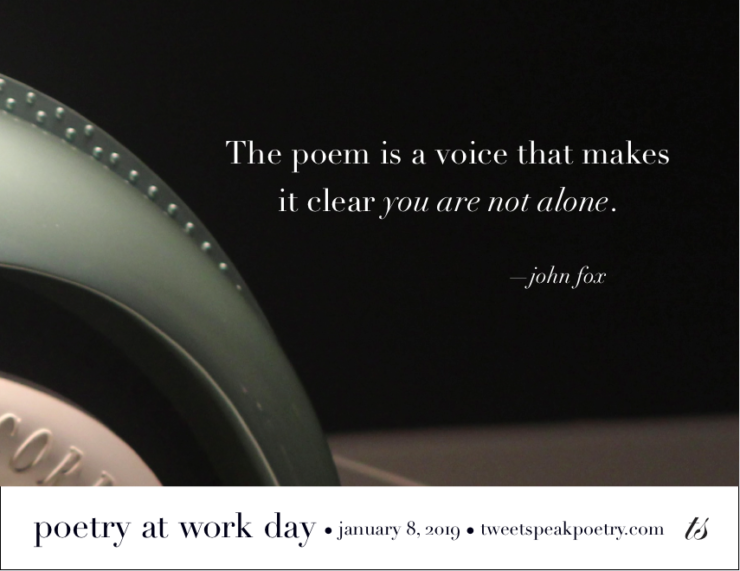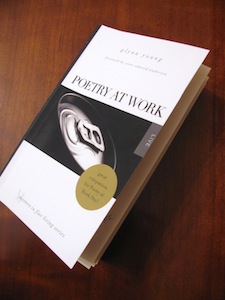Today we celebrate Poetry at Work Day—the day each year when we bring poems to work, share them with colleagues, read them aloud in small (or large) groups, perhaps leave a few on cafeteria tables, wallpaper them on our computer screens, and generally celebrate poetry in the workplace.
Last spring, I found myself rediscovering poetry at work. And rediscovering a sense of gratitude about work.
Three years earlier, I had retired (a bit early). It was one of those “You know, it’s just time to go” decisions. I still had much to offer, but … well, I’ll just leave it at that. It was time to go. I can truthfully say I’ve never regretted the decision. I missed the people I worked with, but I didn’t miss the organizational politics, the constant internal upheavals, and the frenzied “every day a new crisis” atmosphere. I put my newly found free time to good use, writing (including two novels), editing, working with online publications, and spending more time with the grandchildren.
Then, last spring, my former employer called with a short-term project offer. The company was in the process of being acquired, and some help was needed assembling a record of milestones and events for the CEO, helping dispose of a flock of old executive portraits hanging in the conference center, and finding a home for some artifacts that were part of the corporate archives.

It was a great project, one of the best and most fun pieces of work I’ve ever had. One brief example is illustrative, and poetry played a critical role.
The executive paintings were being given to the surviving families if they could be tracked down. Some were easy to find, because they lived locally. Some were not. Two executives had no descendants at all; I was able to find two museums that would be thrilled to acquire their portraits.
The major problem turned out to be the founder of the company himself. A son had died childless; a daughter had had one child in the 1930s. But how to find whether that child had any descendants? I soon learned that not everything is on the Internet. The family seemed to have vanished in the 1950s.
Information was sparse. A blog post about a car restoration in the United Kingdom mentioned that the car’s original owner was the founder’s daughter. The man restoring the car had investigated further, and very casually mentioned she had published a book of poetry in the late 1940s. I was fascinated, but the trail seemed to end there. Out of pure frustration, I googled the name of the poetry book. The first listing was the name of an interior design firm in London. How weird was that? I searched the firm’s website—and discovered its owner was the great-grandson of my company’s founder. He even had the company’s name as his middle name.
The founder’s portrait had found a home, because of a book of poetry. And with the painting went a host of family artifacts that had been in the corporate archives—old family photographs, military discharge papers, the founder’s briefcase, and other personal items that only families would care about. All thanks to a book of poetry.
This was literally a case of poetry at work.

Not all work is as much fun as that project was, but I finished the project with a deep sense of gratitude. Part of that sense was being given the opportunity to find homes for artifacts that might have been thrown out. Part was the accomplishment of ferreting out information that someone else might have gotten tired of looking for. And part was being able to finish the way all work should finish, not with an “It’s just time to go” attitude but with an “I’ve accomplished what I set out to do and it has all been good” attitude. I was truly grateful for that project. It helped me leave the company on a high note, which had not happened three years earlier.
We have considerable resources to help you find and celebrate Poetry at Work Day. They’re all found here at Tweetspeak Poetry, and they include some simple activities, a free “Celebrate Poetry at Work” ebook, 10 great poems about work, a free 2019 Poetry at Work poster, and even a free excerpt from my book, Poetry at Work. Wherever you work, and whatever you might do, let us know in the comments how you celebrated Poetry at Work Day today.
We would all be grateful.
Related:
Resources for 2019 Poetry at Work Day
___________________
Get Poetry at Work, the book, by a Fortune 500 leader
Poetry at Work by Glynn Young, foreword by Scott Edward Anderson
“This book is elemental.” —Dave Malone
- Poets and Poems: Katie Kalisz and “Flu Season” - April 15, 2025
- Poets and Poems: Michelle Ortega and “When You Ask Me, Why Paris?” - April 10, 2025
- Robert Waldron Imagines the Creation of “The Hound of Heaven” - April 8, 2025


Laura Brown says
One of my favorite holidays of the year. I see tweets from around the world already.
Glynn says
Work is a universal activity. So is poetry at work. Where you find work, you find poetry.
Katie says
Glynn,
Thank you for preserving these pieces of history and sharing about the process here. I sense the gratitude and gladness you experienced at helping these artifacts find meaningful homes.
Glynn says
I would have liked to have seen the expression on my own face when I googled the name of the poetry book and found the name of the design firm at the very top of the first page of search results.
Most companies today seem to consider corporate history as something that happened as long ago as 15 minutes. It’s not that there’s an active disdain; it’s more of a total unawareness.